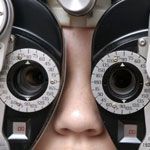
Our eyesight is essential for so many things. We need our sight to read, to drive, to learn and to spot danger. If you have a problem with your eyesight, it can make life very difficult. For instance, young people may experience problems at school if they can’t see properly.
But you can keep an eye (‘scuse the pun) on your eyesight by having your eyes checked regularly, especially if you’re concerned there might be a problem with your eyesight.
Some of the most common problems with eyesight are short-sightedness (when you can’t focus on things that are far away), long-sightedness (when you can’t see things up close), and astigmatism, which is a simple condition whereby the cornea (the clear front of the eye) is oval in shape, rather than round. This causes objects at any distance to appear unclear.
There is also a condition called presbyopia, which is simply a normal aging process of the eyes that makes it harder for people to focus on things up close.
If you experience difficulty in seeing or focusing properly when you’re reading, watching TV or driving, or if you’re experiencing headaches, eyestrain, watery or itchy eyes or excessive blinking, you should get your eyes tested.
An eye test doesn’t just check for vision problems, it can also test you for glaucoma, which is a condition where the optic nerve becomes damaged through a build up of pressure within the eye. This can result in permanent loss of vision. The scariest thing is, often this loss of vision is gradual and without symptoms, so you won’t know it’s happening unless you get tested.
Anyone can develop glaucoma, but the likelihood of glaucoma increases with age. You are also at an increased risk of glaucoma if you have a family history of glaucoma and if you’re short-sighted.
Optometrists recommend that everyone should have an eye test every two years. Most people can get a free eye test with an optometrist through Medicare.
Comments are closed.